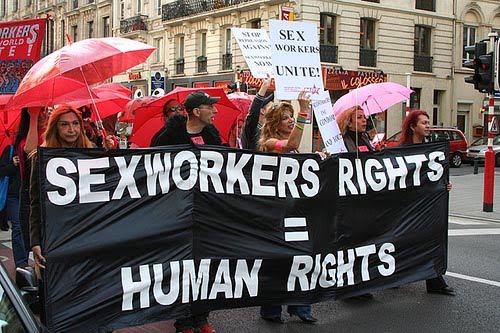The 11 Secrets of a Sex Worker
My name is Douglas and I have been a gay male sex worker for nearly 18 years and involved in sex worker activism for the IUSW and The Harlots Collective for about ten years, here in the United Kingdom. I have worked in Edinburgh, London and Newcastle as an independent and also through several escort agencies. I genuinely and unashamedly enjoy my work as a sex worker. I am lucky that I have always worked in professions that I enjoy. I could not imagine working in a job I did not like or that did not offer me satisfaction emotionally and creatively. That is not to say that in sex work everyone must, or indeed does, enjoy their work. Human experience is complicated and varied and those who sell sex are no different from any other worker in any other profession.
Over the years I have been asked many questions about sex work, activism and what decriminalisation means for sex workers. I have listed below the most common questions I have been asked and the usual response I give.

Top 11 Questions That A Sex Worker Is Most Frequently Asked
Surely no child dreams about becoming a prostitute?
The most common accusation thrown at sex workers is that no child grows up dreaming of being a prostitute. This justifies, for the accuser, the moral perspective that selling sex is wrong and therefore righty condemned by society and punished by the law. The question, however, is a statement of the subjective stigma and prejudice that exists toward certain groups and behaviours within society which moulds attitudes toward those groups, conveniently ignoring the reality of real peoples lives and experiences.
The truth is that no parent can know for certain what choices their children will make when they are older. Sex work decriminalisation is about protecting the lives of sex workers, who are sons, daughters, brothers, sisters and mothers. It is about prioritising safety above the subjective moral judgment inherent in the question.
Isn’t selling sex dangerous?
Selling sex is not in itself dangerous. Having sex is after all a natural function of the human body and a reflection of human attraction and sexual desire and fantasy. Provided an individual takes necessary precautions against sexually transmitted diseases, which, because of their work, sex workers are especially particular about, the risk is minimal. Most sex workers, like many freelance hairdressers, masseurs, plumbers and a host of other professions, work one to one with a singular client. A sex worker is, therefore, no more at risk than any of the other profession which works in a similar way, who also visit clients in their homes or hotels or invite them to their own places of work.
Clients seeking sexual pleasure are no different from clients looking for a relaxing massage, they are not looking to harm the person giving them pleasure. Criminals, however, know they can target sex workers with relative impunity because anti-sex-work legislation prevents sex workers from legally taking the necessary safety precautions that every other profession would think as obvious.
In the UK and other less tolerant legal jurisdictions, sex workers are not allowed to work together for safety. The law states that two or more sex workers working together are classified as running a brothel which carries severe legal penalties. Sex workers are not allowed to work through any third party who is at risk of prosecution for controlling for gain, money laundering and/or living off immoral earnings. Street sex workers face prosecution and are often forced, because of anti-kerb crawling legislation, to make quick decisions about which clients to accept. They are forced to work in isolated areas, work alone and in other words, they, like most sex workers, are made easy targets for criminals. It is, therefore, not sex work that is dangerous, nor our clients who are dangerous, but the law that prevents sex workers from taking common sense safety precautions.
All sex workers are drug addicts and lead chaotic and desperate lives:
Undoubtedly, some sex workers do take drugs. I have always argued that sex work reflects the society in which it operates, therefore, drug abuse exists but is no more prevalent within sex work than it is within society in general. When reference is made that sex workers’ lives are specifically desperate or chaotic, what is really being expressed is stigma and prejudice rather than the reality for the overwhelming majority of sex workers, who have made a considered and sober decision to sell sex. The underlying truth is that individuals in all professions and work environments may face problems and require help at certain times in their lives. Substance addiction and social need are not particular to sex work, yet they are used to restrict the sex worker debate within a context that perceives sex work as always being problematic, partially the reason for this is that our knowledge about the wide range of experiences within sex work is limited.
No one knows with any certainty how many people work in the sex industry within the constituent countries of the United Kingdom. The most visible contact and the easiest accessible information available to the media, politicians and the general public about sex work is gathered from outreach projects and home office statistics. Sex work projects work with specifically targeted groups of sex workers while the Home Office statistics record where sex workers have come into contact for various, but usually negative reasons, with the police. Both the Home Office and sex worker projects reflect, predominately, the experiences of outdoor street sex workers.
Statistically, street workers represent between 5 to 15% of UK sex work. Their experiences, whilst important, are not necessarily representative of the experience that the majority of indoor sex workers have. Independent academic research and I especially reference the recent studies undertaken by Jane Pitcher (Loughborough University), suggests that most indoor sex workers see themselves as a small business requiring a wide and diverse variety of skills to accomplish their job. Increasingly, academic research contradicts the idea that sex workers, indoor or street, are any different to other workers in that their experiences are varied and rarely fit a convenient stereotype.
Aren’t sex workers are all coerced by pimps and traffickers?
Many sex workers choose, for very good reason, to work through a third party even though the third party is breaking the law and can face severe penalties. The sex worker usually pays a third party a proportion of their income from sex work in return for anonymity, security and for the third party to deal with marketing. They organise appointments and where appropriate, provide safe places from which to work. The sex worker is contracting out a role that they don’t have the capacity to perform or do not wish to do themselves. In any other profession, these professionals would be classed as managers and, like in any job, there are good managers, there are bad managers and there are indifferent managers.
The popular media too often sensationalises reporting about sex work by referencing violent pimps, usually street pimps, often foreign, low-level criminals, enticing young women into sex work where they control their income through violence and drugs.
References to pimps in much of the media reflect stigma, cultural prejudices and often racism, rather than reflecting the reality of the often close working relationship that exists between the sex worker and the third party. The word “pimp” especially has racist connotations in the USA, where the term pimp has become intrinsically linked with varied aspects of black culture. Violent pimps undoubtedly do exist, but they are the exception rather than the reality.
Trafficking has become the big scare story, in recent years, used by anti-sex work organisations to justify their anti-sex work narrative and for governments to justify anti-sex work legislation. Trafficking, however, is a lot more complicated than the simplistic story that is being told to create a moral panic.
Legal and illegal migration for sex work to the UK, within the UK and within most countries, is classified as trafficking. Any third party facilitating in any manner the travel for any consenting sex worker, even a UK national, to an appointment to sell sex within the UK can, for example, be prosecuted for trafficking offences. The recorded evidence, however, is that the percentage of sex workers trafficked into the UK (or elsewhere) against their will and forced to sell sex is negligible. The numbers forced to work, sold into slavery in other industries, such as construction, farming, domestic service and even catering are far higher.
There is a growing immigration crisis facing all of Europe, both legally and illegally. It is essential that, within the context of sex work, consent is recognised and that the adult sex worker is not infantilised by legislation determined to make them victims to satisfy a moral and political agenda.

Won’t decriminalisation of sex work mean that children will be encouraged to think that selling sex is a proper and legitimate profession?
There is no evidence from New Zealand, where sex work has been decriminalised since 2003, that the numbers of sex workers have increased. The official numbers have remained very stable since decriminalisation and New Zealand is recognised as the best country in the world in which to work as a sex worker.
Decriminalisation of sex work does not mean that children or adults can be coerced into selling sex by individuals or by the state, it simply means that adults who do sell sex have the protection of the law and choices about how they choose to work safely. No one has ever suggested that decriminalisation would mean that sex work becomes an option for careers advisors or that job seekers should be forced into sex work or lose their benefits. These are scare stories. Decriminalisation simply allows adults who have chosen sex work to work within the law, with the support of the law and with the right to access the same state support structures as every other worker.
Aren’t most sex workers survivors of sexual abuse who started selling sex as children?
There is no evidence to support this story, although, it is a popular and much-repeated myth amongst anti-sex-work organisations who mis-quote research. Evidence tells us that most sex workers began working in their 20’s and not their teenage years (or even younger as some suggest). Are some sex workers survivors of sexual abuse? Undoubtedly yes, just as some nurses are or shop assistants are. Accountants, politicians and your next door neighbour could be too. Being a survivor of abuse of any sort does not pre-condition you to sex work or any other type of work.
Sex workers don’t pay tax:
Sex workers are obliged to pay tax the same as anyone else. If you avoid paying tax then you can face the same legal penalties as anyone else. The difference is that sex workers are not offered the same rights or protections or respect legally or within society for paying tax.
Are you a happy hooker and therefore not representative?
The media are obsessed with the idea that a sex worker is either a happy hooker or a victim of sex work, whereas the truth is that if you enjoy your work or not is irrelevant.
I enjoy my sex work but that does not mean that everyone else does. Sex work is work and sex workers, like all workers, have good days and bad days and indifferent days. Decriminalisation is about rights for all sex workers and not just those who love their work.
During my 17 years in the sex industry, I have met many sex workers and thanks to my partner running an escort agency for nearly 11 years, I was privileged to meet and work with sex workers from many different socio-economic, educational and cultural backgrounds. It was listening and talking to those sex workers and sharing their experiences that led me into activism. When talking about sex work I often reference my personal sex work experience and academic evidence, and I try to give a voice to the overwhelming majority of sex workers who work discreetly and anonymously throughout the UK.
Ultimately every sex workers’ experience is unique but we all experience stigma and prejudice and it is that shared feeling of exclusion that drives us to fight for rights, and for decriminalisation.

Sex work is not work:
Sex workers invest in their work. Condoms, lube, sex toys, lingerie, premises, photographs, internet sites and advertising, the list is long and endless. A sex worker prepares both physically and emotionally for a client, performs for the client, relaxes when the client leaves before preparing for the next. That all sounds like a job to me.
Isn’t selling sex immoral?
Morality is always subjective, it reflects the culture and social conditioning that exists at any particular time or place in history (or indeed the present.) As a sex worker, it is not my job to morally judge anyone.
Provided my clients are of legal age then my job is to provide a service that I consent to and one that the client consents to pay for. I, therefore, provide a consensual adult service.
What do you think about The Swedish Model where sex work is decriminalised but the client is criminalised?
The Swedish Model has failed because it has forced sex work out of sight, has increased social stigma and alienation and by doing so has made sex work more dangerous. It has not ended the demand for sex work which was the ideological position that justified the legislation.
The Swedish government claim that they have reduced sex work, yet acknowledge that they have no proof of how many sex workers there are working in Sweden either before or after their legislation and criminalising clients was introduced. Despite claims made by the Swedish Government that they have decreased demand for sex work we have evidence that the number of massage parlours, where sex is on offer, has increased. Sex worker advertisements are readily available on the internet and there appears to be an increase in the number of foreign nationals that are selling sex which questions the claim made by the Swedish Government that Sweden is no longer a destination for sex trafficking.
Despite the claim that the Swedish sex worker is decriminalised, Swedish sex workers are forced to work alone and they are not able to advertise openly or employ a third party. They cannot legally rent apartments for sex work because when discovered they are evicted, as the apartment owner is liable to prosecution should they be found guilty of renting an apartment to a sex worker. Swedish sex workers cannot access social support, even though being a sex worker is completely legal unless they exit sex work. Family members can be found guilty of living off the earnings of prostitution, again forcing sex workers to work secretly and in isolation. To enable the authorities to prosecute clients, sex workers are coerced into giving evidence against their clients. This again forces sex workers to work in secret in order to protect their clients, their families and themselves.
The Swedish model was not implemented to help sex workers but to coerce sex workers to exit sex work. The idea was to apply very simplistic economic attrition, by targeting the clients of sex workers the Swedish authorities had hoped to end demand and force sex workers out of business. The reality, however, is that sex work continues and indeed flourishes.
Many within Sweden are beginning to question government policy, because of the negative effect the Swedish anti-sex work legislation has on sex workers and on attitudes toward women who sell sex, in particular, foreign migrant sex workers. Despite the governments’ ideological position that women in sex work are always victims, regardless of their consent to sell sex, opinion polls suggest that attitudes toward sex workers are becoming increasingly negative, with a majority of Swedes wanting those involved in selling sex criminalised, and not just their clients. Sweden proves that prohibition does not work, other than to push that which is prohibited underground.
The Swedish government ignored the evidence and the voices of Swedish sex workers. It was an ideologically motivated piece of legislation, that is why it has failed. Sex workers want legislation based solidly upon evidence and to include the voices of sex workers, with the emphasis upon protection and rights, not on endorsing stigma and prejudice.
These are the most common questions I am asked and I suspect the same questions are asked of every sex worker. I have given my usual responses. Feel free to comment.
Sorry, the comment form is closed at this time.














John Hein
All seems common sense to me.
rayzee
That’s the problem, John. Politicians don’t work on common sense, they work on the prejudices of their constituents. They aren’t leaders, they are users. Many of the problems of modern society could be easily cured by some common sense.
Ms Sassy Sherry
Very well written, thank you.
I just want to touch base on question one, many kids have an idea of what they want to be when they grow up around age 7 or so, i would say. I am one of those kids who knew when I was 7 that I wanted to work on a bunny ranch in Vegas, lol. I have no regrets over the last 35 years of my life, except, that I never made it to the bunny ranch to work. I have had good days and bad days, just as anyone who works does. I have loved my job and I have also hated it. The hate came from the undue stigma I/we are prone to. The inability to have a bank account or secure a loan or a mortgage has also caused me to hate, but not my job, rather society, with their judgements and laws against us, forcing us into the shadows, filling us with guilt and shame, which isnt our cross to bear, uts thiers. Its their guilt and their shame that they force upon us so they feel better about their own selves. Then they look the other way as we are raped, robbed, and even murdered. We need this madness to end and not just for us sex workers but for society and for our communities to become stronger and whole. I could go on and on, but I stop here. May I post this on my website?? Peace and Smiles, Ms Sassy Sherry
Dave Nielsen
You’ve got to love this guy. He tries to correct misconceptions but offers nothing more than his opinion.
Jessy Dream
Awesome article. Thanx for sharing. It reveals more about sex work. My friend is working in (I completely support her in this way) and she told me that it’s a very hard work. So everyone earn money as he/she can=)
Pingback: Misconceptions about Sex Work – My Perspective | Krissy Smith
Jeremy Hess
Uhhh I support legalizing prodtitution, but at age 7 you not only knew about sex but knew you wanted to sell access to your body, sexually in a district where it’s legal? Come on